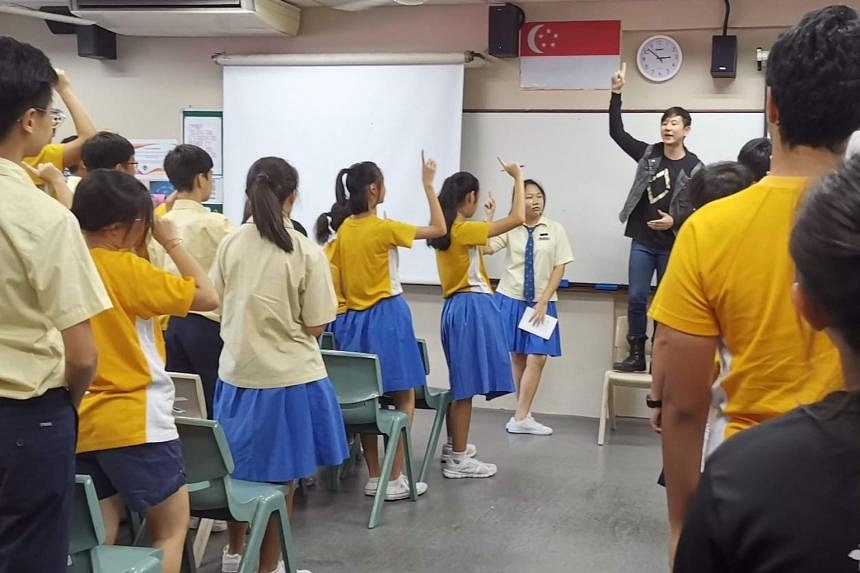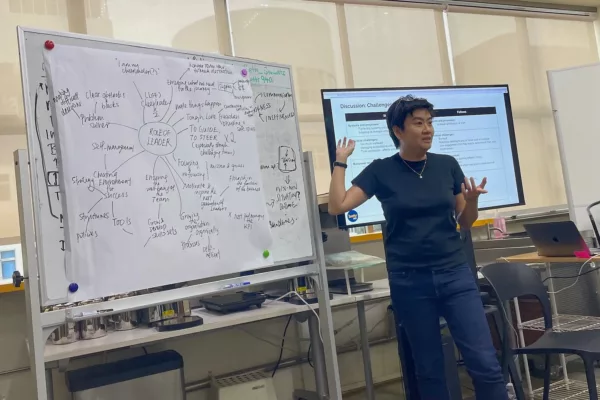August 23, 2024
The Straits Times – Why this non-profit is training students to help spot signs of mental health struggles
Read the original story on The Straits Times.
Non-profit organisation Limitless partners DBS Foundation to equip 10,000 peer support leaders with the know-how to act as a first line of response for people around them.

Together with his team, Mr Asher Low (middle), founder of mental health non-profit Limitless, will conduct training across 15 secondary schools and junior colleges to help students become peer support leaders. Photo by Limitless.
Night fell as a team of five social workers from Limitless mobilised for an urgent mission last June: Finding a 17-year-old girl at high risk of suicide.
Earlier that evening, she had sent a distressing message to a volunteer on the Safehouse server, a support network run by the non-profit organisation on social platform Discord, recalls Limitless founder Mr Asher Low, 37.
Despite the volunteer’s best efforts to calm her down, the girl, who had a history of suicidal tendencies, went silent, says Mr Low. The team could not get in touch with the girl’s parents. They knew they had to act quickly.
Fanning out across the Housing Board neighbourhood, they combed stairwells of multiple blocks. Their hearts were heavy with worry as they scanned every shadowy corner, hoping to find her before it was too late.
This mission embodies Limitless’ goal: To provide a safe space and support for struggling youth. Launched in 2016, Limitless aims to make mental health services more accessible to youth.
“When people think about mental health services, they picture therapists’ offices, counselling sessions or sterile hospital rooms,” Mr Low, who is also its executive director, says.
But he and his team of 15 counsellors, social workers and psychologists take a “more holistic approach” to helping troubled youth.
Mr Low explains that Limitless recognises the impact that life events and circumstances have on mental health. The organisation’s work goes beyond providing support, therapy and casework services for teenagers aged 12 to 25.
It’s about showing up for the troubled youth when they need it most, Mr Low says.
For example, helping them get back to school, find a job, or even assisting in the search for a lost pet. “These are (some of the) ancillary things we do to (support their recovery).”
Limitless’ services are free for youth. Cost is often a factor, alongside the need for parental consent and social stigma, that prevents struggling youth from seeking help, he adds.
It also organises outreach and public education programmes through workshops, booths and talks.
Help is nearby
Each year, Limitless supports about 1,000 to 1,200 young people grappling with mental health issues, says Mr Low.
It’s a significant number; but with rising mental health challenges in Singapore, he sees an urgent need to expand their reach.
In 2022, there were 476 cases of reported suicides in Singapore, a concerning 25.9 per cent rise from the year before, says suicide prevention centre Samaritans of Singapore. An increase in suicide deaths was also recorded across most age groups, particularly among the youth and the elderly.
In a parliamentary motion addressing mental health in February, then Deputy Prime Minister Lawrence Wong identified mental health as a national priority.
He also laid out key plans to achieve several goals by 2030 or earlier, including introducing mental health services at all polyclinics and 900 more general practitioner clinics.
Clearly, more people needed to get onboard. But “I don’t think we’ll ever be able to train enough professionals to meet that need”, says Mr Low.
The “creative” solution? Train as many young people as possible to provide support to those around them, says Mr Low. “Peer support is very critical in managing the mental health situation on the national level,” he explains.
In 2023, Limitless entered a two-year partnership with DBS Foundation that seeks to make mental health support accessible to more youth.
DBS Foundation will fund the training of 10,000 peer support leaders from across 15 secondary schools and junior colleges. By equipping these teenagers with the know-how to recognise signs of mental health struggles among peers, they can hopefully become the first line of response for their peers.
Limitless will also take its message directly to students by holding talks and fairs in schools, teaching them how to seek help when needed. DBS Foundation provides funding and mobilises the bank’s employee volunteers at these events.
The foundation will also subsidise therapy for some 1,800 troubled underprivileged youth at Limitless. The therapy sessions are free for these youth.
The ultimate goal for Limitless? For every young person to be a peer supporter, says Mr Low, who’s also a steering committee member with the SG Mental Well-Being Network.
Launched in 2022 by the Ministry of Culture, Community and Youth, the nationwide initiative aims to strengthen peer support within neighbourhoods, create safe spaces and equip participating residents with the skills to identify those who may need help.
“We want to ensure that when someone is grappling with mental health issues, the community (can identify and) are equipped to respond,” he adds.
Sometimes, the smallest act can have the biggest impact – just as it did that one night last June when, after hours of searching, the Limitless team finally found the girl huddled in a stairwell on the 21st floor of an HDB block. Relief washed over them as they sat with her, helping her calm down.
She was shaken, but alive. In that moment, they knew their presence had made all the difference.
Mental health in Singapore
Covid-19 has pushed mental health to the forefront of national concern.
Almost half of Singaporeans say mental health is the biggest health issue the nation faces, ahead of cancer, according to a 2023 report by market research firm Ipsos.
The National Population Health Survey 2022, published by the Ministry of Health, says the prevalence of poor mental health rose from 13.4 per cent in 2020 to 17 per cent in 2022.
Workplaces grappling with burnout, employees walking away from their jobs, and kids resisting returning to school – these are all symptoms of declining mental health, says Ms Pamela Chng, 48, founder of local non-profit organisation Bettr Lives.
She believes that addressing these challenges require more than just a return to “business as usual”. “(We) need to grow, and expand our capacity”, she says, to deal with the current challenging and uncertain environment.
Her organisation is helping schools, workplaces and communities to do just that through training programmes that improve emotional skills and resilience.
Bettr Lives uses a framework developed by US-based non-profit organisation Six Seconds, which researches and creates tools and methods to improve emotional intelligence.
The curriculum is structured and measurable, says Ms Chng. There are eight skills you can develop to increase your emotional intelligence, and the progress is tracked via a score dashboard. “(The dashboard) is useful as it provides us with tangible data to work with as action points.”
Brewing greater impact
Ms Chng’s conviction around the importance of emotional skills stems from the success of her social impact work under Bettr Group.
Founded in 2011, the social enterprise is an impact-driven coffee brand with a coffee roastery, an academy providing speciality coffee, tea and mixology education. It also provides coffee services like corporate coffee bars and mobile coffee carts.
Bettr Group runs a social programme to help marginalised women and youth at risk, equipping them with not just employable food and beverage skills, but also mental and emotional resilience.
It was a recipient of the DBS Foundation Grant in 2015.
The DBS Foundation Grant provides social enterprises and small and medium-sized enterprises (SMEs) with up to $250,000 – in addition to mentorship, capacity-building and other support measures – to scale up their business and drive positive social change.
Applications for this year’s DBS Foundation Grant are open till Aug 31.

Photo by Bettr Lives.
“Over the last 13 years, we’ve seen how (Bettr Group programmes) have transformed individuals”
– Ms Pamela Chng, 48, founder of local non-profit organisation Bettr Lives
Now she wants to expand the impact through Bettr Lives, which she founded in 2019 as a separate non-profit organisation. “We extract the emotional skills component of the training we’ve been running,” she explains, “and (hope to) scale it beyond the marginalised groups that we were helping.”
Bettr Lives focuses on three audiences:
- Social entrepreneurs and non-profit leaders to help them lead with emotional intelligence
- Organisations to help create inclusive and empathetic workplaces, and
- Schools to help youth develop emotional literacy and resilience.
“Emotional skills are a core part of a healthy human being,” says Ms Chng. “When you’re able to understand and process what you’re feeling, then you start to make (better) decisions as well.”
